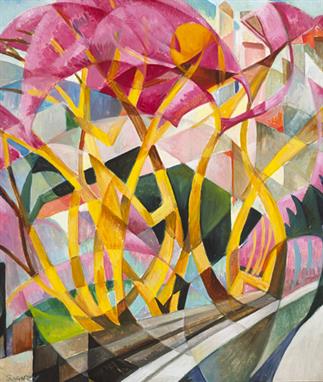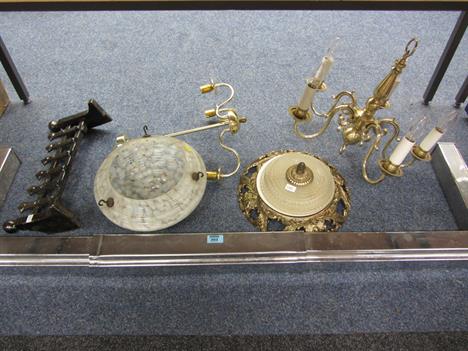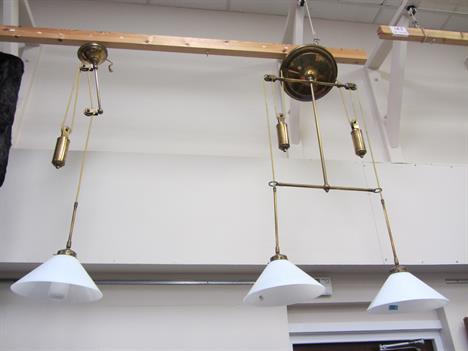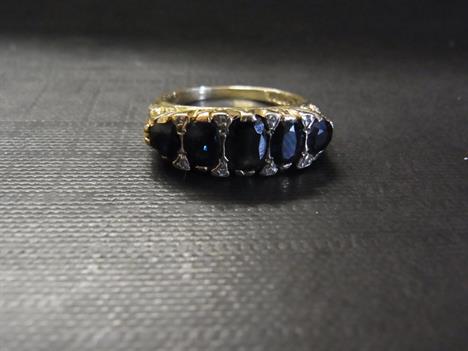534297 Preisdatenbank Los(e) gefunden, die Ihrer Suche entsprechen
534297 Lose gefunden, die zu Ihrer Suche passen. Abonnieren Sie die Preisdatenbank, um sofortigen Zugriff auf alle Dienstleistungen der Preisdatenbank zu haben.
Preisdatenbank abonnieren- Liste
- Galerie
-
534297 Los(e)/Seite
PU RU (1896 - 1963) MOUNTAIN LANDSCAPE China, undated. 81 x 25 cm. Ink and colours on paper. Hanging scroll, brocade mounting. Inscription: "The shadows of the poplars and willows caress the long bank, the spring waves reach the fishing boat. The sun will soon set, a light wind blows, carrying the fragrance of flowers from the opposite bank." Signed: Pu Ru. Oval seal before the inscription: Qing nanji. Seal after the inscription: Pu Ru Provenance: Collection of a Czechoslovak journalist. Obtained from master Liu Jintao in Beijing in the late 1950s. Reserve price: 220,000
William Percy French (1854-1920) ON THE ROCKS [ROCK OF CASHEL, COUNTY TIPPERARY] watercolour signed lower left; titled on reverse; with Oriel Gallery label on reverse 9.75 by 6.5in., 24.375 by 16.25cm. P Oriel Gallery, Dublin; Private collection;Whyte`s, 30 May 2011, lot 66A;Whence purchased by the present owner Nulty, Oliver, Lead Kindly Light, 35 Years of Percy French at the Oriel Gallery: A Millennium Retrospective, Oriel Gallery, Dublin, 2002, p.122 (illustrated)
Aloysius C. OKelly (1853-1936) UN VERRE DE VIN oil on canvas signed lower right 26 by 21.5in., 65 by 53.75cm. P Family of the artist An Exhibition of 17th - 20th Century Irish Paintings`, Gorry Gallery, Dublin, 19 May to 2 June 2010, catalogue no. 30 (illustrated p.28) O`Sullivan, Niamh, Aloysius O`Kelly: Art Nation, Empire, Dublin 2010, catalogue no. 81 O`Kelly executed a number of portraits of elderly men and women to exude character. These demonstrate his vigorous prowess as a portrait painter. What these portraits show is a progressively fluid and impressionistic treatment, as the handling becomes looser and livelier. The fisherman is dressed in his working clothes, smock and sabots. Pannier at his feet, he is smiling and at ease. Although verging on the monochromatic he seems to be full of the joys of life. Somewhat unusually or O`Kelly - who tends towards solemn when treating the fishermen and farmers, the labourers of the western seaboards of France and Ireland - this one has the air of a bon viveur. Sitting by the rustic table, bottle to hand, traces of Bonnat`s influence, specifically his rugged naturalism, can clearly be discerned. In the virtuosity of draughtsmanship, these portraits are a tribute to Gérôme while the loose yet controlled brushwork, broad values, and the use of dramatic light and shade are a testimony to Bonnat`s realist teaching. But, ultimately, O`Kelly`s portraits are his own. From the late 1870s through to his old age, he produced a range of rural portraits of considerable power. Although psychologically penetrative, in many respects these portraits are less about the individual than the human condition. We are grateful to the Gorry Gallery and Prof. Niamh O`Sullivan for their permission to reproduce this note.
Mary Swanzy HRHA (1882-1978) TREES oil on canvas signed lower left 21 by 18in., 52.5 by 45cm. P Family of the artist Although she studied art in Paris in 1905 and 1906 where she was amongst the first Irish artists to see the work of Pablo Picasso, Swanzy did not begin making and exhibiting Cubist inspired work until the 1920s and 1930s. She was one of Ireland`s most innovative exponents of this approach, using it in imaginative ways in a range of landscapes, figure studies and paintings of propellers. As she never dated her paintings, it is difficult to be precise about the chronology of the work, but she appears to have made and exhibited most of her Cubist inspired paintings after 1920. Having moved back to Dublin from Paris, Swanzy continued to travel widely visiting London, Italy, Czechoslovakia, Polynesia and the United States. She maintained contact with the French art world throughout the 1910s and 1920s, exhibiting at and becoming a committee member of the Salon des Independants, the largest show of modern art in Paris. Her work was shown at this venue alongside that of the Orphic cubists, Sonja and Robert Delaunay. Orphism, a hugely influential movement, was concerned with the impact of light and colour on the vision of the artist. The paintings of Robert Delaunay are preoccupied with aeronautical flight and altitude through which he could demonstrate how form is made of pure colour. The influence of these ideas is apparent in Trees. The bright colours and dynamic geometric patterning of the composition of Trees are also evocative of speed and movement. Swanzy was clearly aware of Italian Futurism and British Vorticism when she painted the work. Both movements stress the importance of dynamism in art and of representing technology. The railway track or roadway in the foreground of Trees suggests movement through the landscape resulting in a distortion of the forms. Swanzy`s father was a well-known ophthalmic surgeon and her fragmentation of the composition is equally reminiscent of ophthalmic lenses and optical devices.The giant pink trees with their swaying yellow barks are probably inspired by the exotic vegetation that Swanzy saw on her travels to Samoa and Hawaii in the 1920s. The tall towers in the distance (to the right) recur in several of her paintings, a memory of San Gimignano, the medieval city in Tuscany, near to Florence where the artist lived for a period before World War One. Swanzy draws on her vast experiences of travel and modern art in her work. The result is an inventive and unique engagement with Cubism and Futurism that was not always valued by her contemporaries in Dublin which she left in 1926 to settle with her sister in London. The originality of her work, however, ensured Swanzy`s rediscovery as one of Ireland`s most significant modernist painters at the end of her life in the 1960s and 1970s when she finally enjoyed critical and commercial success. Trees is an important example of her Cubist work.Dr. Róisín KennedyApril 2014
Gerard Dillon (1916-1971) HOME WITH THE CATCH oil on canvas signed lower right 23 by 23.5in., 57.5 by 58.75cm. L Waddington Galleries, Dublin;Where purchased by the present owner`s father Four Ulster Painters`, Victor Waddington Galleries, Dublin, September, 1947;`Four Ulster Painters`, Heals Mansard Gallery, London, May to June 1948, catalogue no. 36 (a joint exhibition with Daniel O`Neill, George Campbell and Neville Johnson);`Gerard Dillon, Art and Friendship Summer Loan Exhibition`, Adam`s, Dublin, 2-26 July 2013 (travelled to Ava Gallery, Clandeboye, 1-29 August 2013) catalogue no. 39 Gerard Dillon, Art and Friendship Summer Loan Exhibition`, Adam`s, Dublin, 2013, catalogue no. 39, p.41 (illustrated) Gerard Dillon was born in West Belfast in 1916 but spent much of his life in London where he earned a living as a painter and decorator. Many of his most popular, and important, paintings depict scenes of everyday life on the west coast of Ireland. He first visited the west in 1939 and became enchanted with the landscape and the people, making them the major theme of his work throughout the 1940s and 1950s. Home with the Catch is a western scene where a young family make their way through the village with their daily catch of fish. Fish were both a staple of their diet and a commodity that they could trade. Their clothing is recognisable as the traditional dress once common in Connemara and the Aran Islands. The woman`s red skirt and white woollen jumper along with the man`s baggy woollen trousers and waistcoat and their simple leather shoes, known as pampooties, locate this image in a particular time and place. Stylistically similar to Irish Peasant Children (c.1949), this work also resembles the young couple carrying fish depicted in Dillon`s textile work Gentle Breeze, which he hand stitched in 1952. Recalling his first experience of the western seaboard, Dillon wrote that the west was `a great strange land of wonder to the visitor from the red-brick city`.(1) Like many artists and writers before him, he held a romantic view of the west as both the locus of an authentic Irish culture and a `primitive` place, free from many of the restraints of wider Irish society. Writing in 1955, he claimed that Connemara is `the place for a painter` and eulogising about the variety of the rugged landscape, the quality of the light and the simplicity of daily life, concluded: `one could live here forever but being neither a fisherman nor farmer, but only a painter, I`m forced to come back to city life to sell work - and hope to save enough to come back to Connemara`.(2) Although Dillon recognised that he was an outsider in Connemara, during the period he spent living on Inishlacken in 1950, he adopted elements of traditional dress, travelled back and forth to the mainland in a currach and embraced the way of life wholeheartedly. As James White pointed out: `For a nationalist Catholic like Gerard Dillon, living in London and desperately wanted to belong to a Republican nation called Ireland ... Connemara with its remoteness, its delightful stonewall fields, mountains, lakes and seacoast and above all islands like Inishlacken where he could cut himself off for a spell and live in a tiny cottage, with no social life to speak of and a boat journey away from barracks, church or pub - all this gave him the feeling of having found a land free of all the restrictions of oppression which he had come to accept as being there to offend him`.(3) Dillon`s initial interest in painting the west and its inhabitants was sparked by Seán Keating`s illustrations for Playboy of the Western World. William Conor`s focus on the daily lives of working people in Ulster was another early influence. In Home with the Catch, Dillon brings these influences together to create an original vision of the west which combines romance and realism. Dr Riann CoulterApril 20141 Gerard Dillon, `The Artist Speaks`, Envoy, 4 February, 1951, p.39.2 Gerard Dillon, `Dear Tourist`, Ireland of the Welcomes, Bord Fáilte, Dublin, May/June, 1955, p.30.3 White, James, Gerard Dillon: An Illustrated Biography, Dublin: Wolfhound Press, 1994, p.10.
A 19th century circular horn lidded box, the lid centrally set with faceted rock crystal panel, the base and lid each with heat impressed decoration which when viewed through the rock crystal and held up to the light provides a repeating optical effect, 5.75cm diameter, together with a 19th century Chinese ivory needle case heavily carved with dragons, birds and foliage, 13cm long, lid lacking
A sapphire and diamond cluster dress ring - Designed as seven oval-shape vari-coloured sapphire and brilliant-cut diamond clusters to the brilliant-cut diamond trifurcated shoulders and plain band - Estimated total diamond weight 0.75ct - Stamped 750 - Ring size L 1/2 - Weight approx 6.7gms. Condition Report: Good - With light surface scratches.
An early 20th century 18ct gold signet ring - The square-shape panel with engraved initial 'G' to the tapered shoulders and plain band - Hallmarked Birmingham,1929 - Ring size I 1/2 - Weight approx 3.3gms. Condition Report: Good to fair - With light dents and scratches in keeping with age and wear - With engraving to the reverse of the panel reading ' Minimus to Mummy'
An amber bead necklace - with some loose amber beads - Total weight approx 41.1gms - Some rock crystal and paste beads - A white metal chain with imitation pearl and purple bead spacers - Together with a bead choker necklace - Length approx 39cms. Condition Report: Good to fair - With light surface scratches and blemishes in keeping with wear - Amber possibly reconstituted.
A pair of carved jade ear pendants - Each designed as a carved foliate jadeite panel suspended from the circular-shape jade cabochon - Stamped 9ct - Length 4cms - Weight approx 4.4gms. Condition Report: Good to fair - Light surface scratches - One carved foliate panel with deficient gold back - Jade untested for natural colour origin - With screw back fittings.
Three pendants and chains - To include a shell cameo - An opal cabochon - Together with a revolving heart-shape pendant with engraved detail - With marks indicating 9ct gold - Length of chains approx 42 to 48cms - Total weight approx 7.4gms. Condition Report: Good to fair - With light surface scratches in keeping with wear.
An 18ct gold diamond two-stone crossover ring - The old-cut diamonds to the asymmetric shoulders and plain band - Estimated total diamond weight 0.20ct - Hallmarked London - Ring size N 1/2 - Weight approx 1.6gms. Condition Report: Light surface scratches in keeping with wear - Diamonds lively and bright - Small chips to table facet.
A 9ct gold gem-set full-circle band ring - Hallmark partially rubbed - Ring size L 1/2 - Weight approx 1.6gms - Together with a 9ct gold cross pendant - Hallmarked Birmingham - Length 4cms - Weight approx 1.9gms Condition Report: Good to fair - Light surface scratches in keeping with wear - Light rubbing to some facet edges.
An 18ct gold diamond three-stone ring - The graduated old-cut diamonds with brilliant-cut diamond double spacers to the scroll gallery and plain band - Estimated total diamond weight 2.10cts - Estimated I-J colour - P1-P2 clarity Hallmarked London - Ring size R 1/2 - Weight approx 5.8gms. Condition Report: Good - With light surface scratches - Diamonds lively and bright - With some natural internal inclusions visible with a 10x lens.
An early to mid 20th century 18ct gold ruby and diamond two-stone crossover ring - The old-cut diamonds within square-shape ruby surrounds to the asymmetric shoulders with rose-cut diamond detail and plain band - Ring size Q 1/2 - Weight approx 2.6gms. Condition Report: Good to fair - Light surface scratches in keeping with wear - Minor surface abrasion to rubies - Small gap in ruby setting.
A 9ct gold sapphire and diamond ring - The graduated oval and circular-shape sapphires with diamond highlights to the carved gallery and plain band - Hallmarked London - Ring size Q - Weight approx 5.8gms Condition Report: Good - With light scratches in keeping with wear - Slight rubbing to sapphire facet edges.
A late Victorian 18ct gold opal and diamond dress ring - The oval and circular opal cabochons and old-cut diamonds to the decorative shoulders and plain band - Hallmarked Chester,1900 - Ring size N - Weight approx 3.9gms Condition Report: Good - Light surface scratches in keeping with wear - Diamonds lively and bright - Opals with a good play of colour.
A 9ct gold coral cameo brooch - Hallmarked Chester - Length 3.5cms - A seed pearl foliate bar brooch - Stamped M B & Co 9ct - Length 3.5cms - Together with a yellow metal moonstone stickpin - Tests as gold -Length 5.5cms - Total weight approx 5.7gms Condition Report: Good - With light scratches in keeping with wear.
An assortment of six pairs of earrings - To include lapis lazuli, shell cameo and opal triplet - Together with a yellow metal opal triplet pendant - Four pairs of earrings with marks indicating 9ct gold - Total weight approx 15.7gms Condition Report: Good to fair - With light surface scratches.
-
534297 Los(e)/Seite
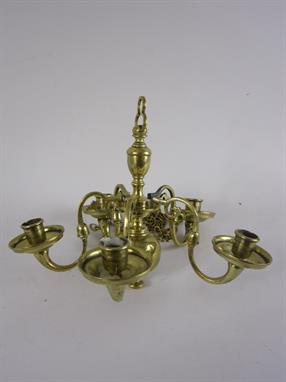















![William Percy French (1854-1920) ON THE ROCKS [ROCK OF CASHEL, COUNTY TIPPERARY] watercolour signed lower left; titled on re](http://lot-images.atgmedia.com/SR/10092/2903219/9-20145622211_468x382.jpg)


